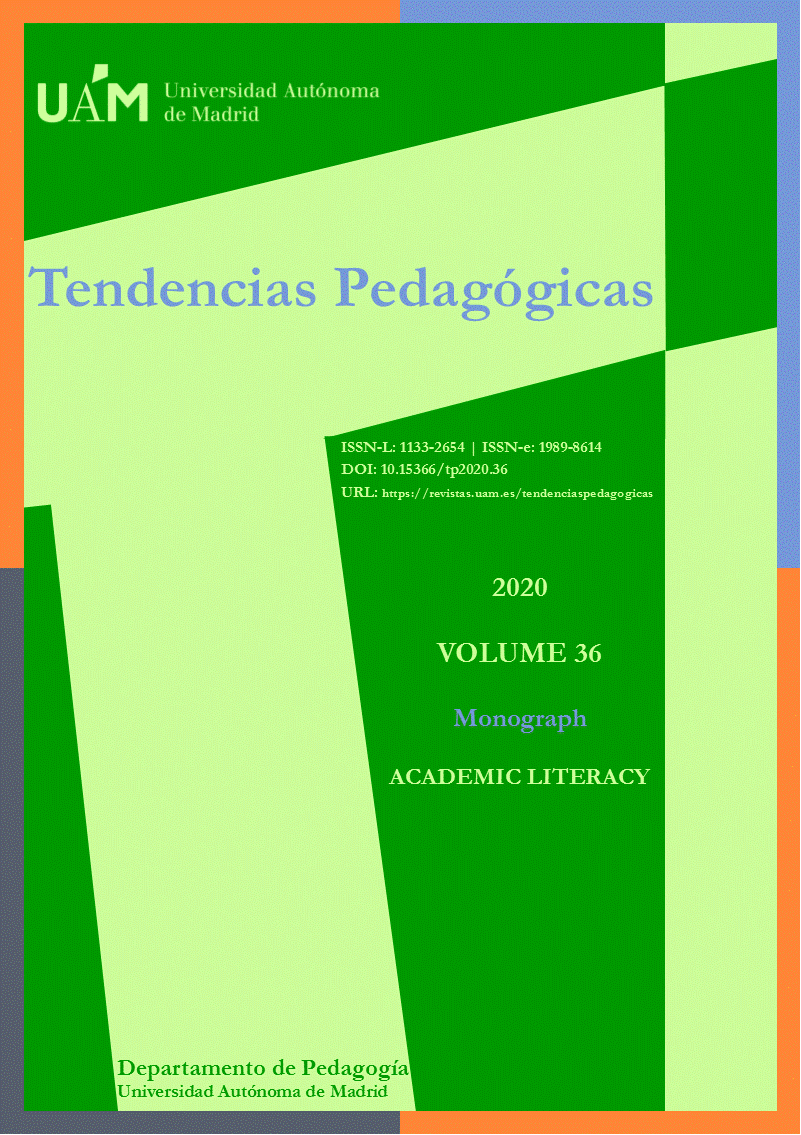Keywords:
educational innovation, school improvement, secondary education, project based learningCopyright (c) 2020 Maria José Pérez Albo, Alicia Gutiérrez Lacalle

This work is licensed under a Creative Commons Attribution-NonCommercial 4.0 International License.
Abstract
This paper aims to show the main elements on which innovation processes are based at a public Secondary school in Madrid, built up from the key elements found by the educational research. Along the description, we will point out some common issues such as global projects, several ways for teacher’s training, vias to promote collaboration between teachers of different areas and many other items which contribute to carry on innovation processes in order to give students a high quality education and an active role in their learning process. We will also explain different strategic approaches that are currently being carried on to set up a personalized, inclusive and quality education process. Regarding that, globalized projects become a driving force that facilitates us to join together all the elements of the educational structure and to connect the various contents of different subjects, as well as enable the reorganization of learning spaces and times. Those strategies promote the consolidation of the main competences needed to achieve a student’s global growth, leading not only to the acquisition of knowledge but also to the development of emotional intelligence, social abilities, team working, critical and investigating attitude, in the end, soft skills that will be decisive for the academic and professional development of the students.
Downloads
References
Ainscow, M. (2016). Diversity and Equity: A Global Education Challenge. New Zealand Journal of Educational Studies, 51(2), pp. 143-155. doi: 10.1007/s40841-016-0056-x
Ainscow, M., Dyson, A., & Weiner, S. (2013). From exclusion to inclusion: a review international literature on ways of responding to students with special educational needs in schools. En-clave pedagógica: Revista Internacional de Investigación e Innovación Educativa, 13, pp. 13-30. Recuperado de https://rabida.uhu.es/dspace/bitstream/handle/10272/8169/De_la_exclusion_a_la_inclusion.pdf?sequence=2
Bolívar, A. (2005). Dónde situar los esfuerzos de mejora. Educação & Sociedade, 26(92), pp. 859-888. doi: 10.1590/S0101-73302005000300008
CAST (2011). Universal Design for Learning Guidelines. Version 2.0. Wakefield, MA: Author.
Durán, D. (2019). Aprendizaje docente entre iguales: maestros y escuelas que aprenden unos de otros. Ámbitos de Psicopedagogía y Orientación, 50, pp. 50-62. doi: 10.32093/ambits.v0i50.1219
Escudero, J., & Martínez, B. (2011). Educación inclusiva y cambio escolar. Revista Iberoamericana de Educación, 55, pp. 85-105. doi: 10.35362/rie550526
Gil, A. J., Antelm, A. M., & Cacheiro, M. L. (2018). Análisis de la capacidad de innovación escolar desde la perspectiva del profesorado de educación secundaria. La escuela como organización que aprende. Revista Educar, 54(2), pp. 449-468. doi: 10.5565/rev/educar.864
Gros, B., & Lara, P. (2009). Estrategias de innovación en la educación superior: el caso de la Universitat Oberta de Catalunya. Revista Iberoamericana de Educación, 49, pp. 223-245. doi: 10.35362/rie490681
Hargreaves, A., & Fullan, M. (2014). Capital profesional. Madrid: Morata.
Harris, A. (2013). Distributed leadership: Friend or foe? Educational Management Administration and Leadership, 41(5), pp. 545-554. doi: 10.1177/1741143213497635
Hernández, F. (Coord.). (2017). ¡Y luego dicen que la escuela pública no funciona! Investigar con los jóvenes sobre cómo transitan y aprenden dentro y fuera de los centros de secundaria. Barcelona: Octaedro.
Kyriakides, L., Christoforou, C., & Charalambous, C.Y. (2013). What matters for student learning outcomes: A meta-analysis of studies exploring factors of effective teaching. Teaching and Teacher Education, 36, 143-152. doi: 10.1016/j.tate.2013.07.010
López, S. (2018). Diseño de espacios educativos. Aprendizaje y Creatividad. Madrid: Ediciones Khaaf.
Martínez García, I., & Gil Flores, J. (2018). Explicación de la satisfacción en la dirección escolar a partir del desempeño de la función directiva. Education in the Knowledge Society, 19(1), pp. 77-95. doi: 10.14201/eks20181917795
Murillo, F. J., & Krichesky, G. (2015). Mejora de la Escuela: medio siglo de lecciones aprendidas. REICE, Revista Iberoamericana sobre Calidad, Eficacia y Cambio en Educación, 13(1), pp. 69-102. Re-cuperado de https://revistas.uam.es/index.php/reice/article/view/2800/3015
Murillo, F. J., & Martínez-Garrido, C. (2018). Factores de aula asociados al desarrollo integral de los estudiantes: un estudio observacional. Estudios Pedagógicos XLIV(1), pp. 181-205. doi: 10.4067/S0718-07052018000100181
Nair, P. (2013). Diseño de espacios educativos. Rediseñar las escuelas para centrar el aprendizaje en el alumno. Madrid: SM.
Roselló, M. (2010). El reto de planificar para la diversidad en una escuela inclusiva. Revista Iberoamericana de Educación, 51(4), pp. 1-10. Recuperado de https://rieoei.org/historico/deloslectores/3197Ramon.pdf https://doi.org/10.35362/rie5141825
Sloep, P., & Berlanga, A. (2011). Redes de aprendizaje, aprendizaje en red. Comunicar, XIX(37), pp. 55-64. doi: 10.3916/C37-2011-02-05
Stoll, L., & Fink, D. (1999) Para cambiar nuestras escuelas. Reunir eficacia y mejora. Barcelona: Octaedro.
Sancho, J. M. (2018). Innovación y enseñanza. De la “moda” de innovar a la transformación de la práctica docente. Educação, 41(1), pp. 12-20. doi: 10.15448/1981-2582.2018.1.29523
Murillo, F. J., & Muñoz-Repiso, M. (2020). La mejora de la escuela. Un cambio de mirada. Madrid: MECD/Octaedro.
Sancho, J. M. (2018). Innovación y enseñanza. De la “moda” de innovar a la transformación de la práctica docente. Educaçao, 41(1), pp. 12-20. doi: 10.15448/1981-2582.2018.1.29523
Sun, J., & Leithwood, K. (2014). Efectos del liderazgo escolar transformacional en el rendimiento de los estudiantes. Revista Iberoamericana sobre Calidad, Eficacia y Cambio en Educación, 12(4), pp. 41-70. Recuperado de https://revistas.uam.es/index.php/reice/article/view/2836/3053
Trujillo, F. (2018). Activos de aprendizaje. Utopías educativas en construcción. Madrid: SM.
Vergara, J. J. (2015). Aprendo porque quiero. Aprendizaje basado en proyectos, paso a paso. Madrid: SM.

